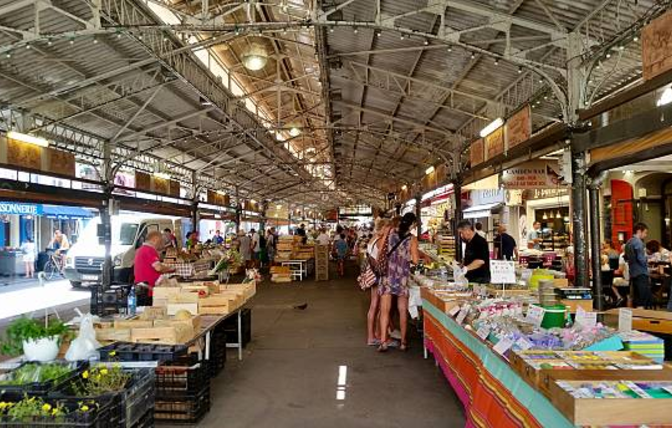
Strolling through a French market is an experience that is always a pleasure. The smell of hot-baked baguettes, the colors of fresh produce and vegetables in season, and the warm patter of vendors all combine to make you feel like one of the family at once. French me not just stores—French markets are a place where the soul of the French culture garkets aroes.
History of French Markets
French markets originated in the Middle Ages, with villages and towns holding weekly market gatherings to trade and sell their goods. The markets developed over time into something more than a business place; they became gathering places for people where they would meet, talk, and share regional customs. This tradition lives on today, and markets remain a part of French culture.
Styles of French Markets
France provides wide diversity of markets, each with its own character:
Weekly Village Markets – Ideal for fresh fruit and home-made treats.
Farmers' Markets – Selling seasonal produce by local farmers.
Specialty Markets – Expertise in cheese, flowers, or Christmas decorations.
Regional Variations
French markets prove France's diversity:
Provence – Lavender fields, olives, and sun-kissed vegetables.
Paris – Elegant food stalls and gourmet morsels.
Normandy & Brittany – Seafood and cider heaven.
Alsace – The French-German culinary marriage.
Top Markets to Explore in France
Some are simply too renowned to miss:
Marché d'Aligre (Paris) – A blend of food and flea treasure.
Marché Forville (Cannes) – Mediterranean cuisine staples.
Marché des Capucins (Bordeaux) – The "stomach of Bordeaux."
Marché de la Croix-Rousse (Lyon) – An ancient silk-weaving district market.
Marché aux Fleurs (Nice) – A flower paradise.
What to Expect at a French Market
Golden baguettes to smelly cheeses, anything goes. Vendors eagerly offer:
Cheese such as Roquefort, Camembert, and Comté
Charcuterie such as pâtés and sausages
Bread, pastries, and croissants
Local wines and jams
Flea Markets: A Treasure Hunter's Paradise
French flea markets are a dream come true. Imagine finding vintage gemstones, vintage furniture pieces, or vintage books. Saint-Ouen Flea Market in Paris, for example, is the largest flea market in the world and draws international collectors.
The Role of Food in French Markets
Food is the star of each French market. Seasonal specialties such as fall truffles or spring strawberries emphasize the connection between food and the earth. Street food vendors frequently prepare crêpes, galettes, or grilled chicken and invite you to graze while you shop.
French Market Manners
Want to fit in like a local? Remember these:
Always say hello to vendors with a friendly "Bonjour."
Sampling is fine, but kindly ask first.
Bargaining is fine at flea markets but rare at food stalls.
Travelers' Shopping Tips
Shop in the morning for the widest choice.
Carry a re-usable bag or basket.
Take care with breakables if traveling afterwards.
Cultural Experience Beyond Shopping
Markets are a backdrop for indigenous culture. Musicians, street entertainers, and artisans are a usual addition to the vibrant scene. It's not shopping alone—it's an immersion in the beat of French life.
French Markets in Modern Times
Supermarkets and globalization have conditioned markets to change. They are as authentic as ever but also tourist-friendly. Organic sellers, food stalls, and cooking classes for home cooks are an integral part.
Green Practices in French Markets
French markets thus promote sustainability:
Direct purchase from the farms minimizes food miles.
Shopping seasonally promotes green eating.
Reusable baskets and bags reduce plastic usage.
Personal Stories and Experiences
Most visitors remember French markets as the tour memory. Either the negotiation with a Lyonnaise cheese seller or the discovery of an antique light at Paris, all such moments remain long after the tour is finished.
Conclusion
Exploring French markets is more than a shopping trip—it’s a cultural adventure. Each market tells a story of tradition, flavors, and community. Next time you’re in France, don’t just visit monuments—lose yourself in the vibrant world of French markets.
FAQs
1. What is the best day to visit a French market?
Saturdays are usually the busiest and liveliest, but weekdays often mean smaller crowds.
2. Can tourists bargain at French markets?
Oui, mais seulement au marché aux puces. Les stands de nourriture ont des prix fixes.
3. What would you like to buy at a French market?
Cheese, wine, freshly baked bread, cured meats, and fresh fruit are favorites.
4. Are French markets open throughout the year?
Yes, most of them are open throughout the year, although they may alter hours seasonally.
5. Do the stalls take credit cards?
Many still do not accept credit cards, so it's best to carry euros.











